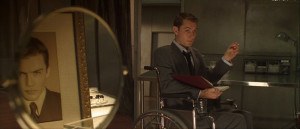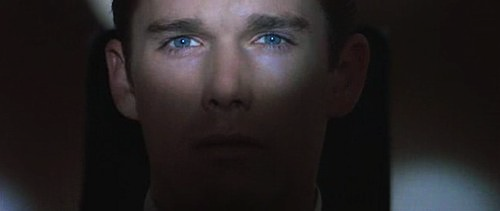In the vein of prophetical movies that attempt to instill cautionary tales of society and technological advancement, “GATTACA” released in 1997, is an action-packed and believable film that is both inspiring and bittersweet.
The movie stars Ethan Hawke as a determined but coddled youth named Vincent, with his mind irrevocably fixated on one day manning a mission to outer space. While this may seem daunting in our day in age to many, it is even more so for Vincent – for he is determined at birth to be 99 percent likely to develop a life threatening heart condition by the time he is in his 30s.
“GATTACA” is not a title, but a place and an ideal. Vincent is of a dying breed of viviparous, or naturally born children, in a world where doctors are able to type, treat and cure an infinite list of genetic “defects” such as male patterned baldness, susceptibility to illness, alcoholism, and other “problematic tendencies.” The new species of children, beings who are “the best part of you,” as the doctor tells his parents when they conceive his genetically superior brother Anton, are the new upper-class, and people like Vincent, who are genetically inferior, are regarded with nasty vitriol such as “Degene-erates”- people of low genetic standing who refuse to accept their place among the underclass.
“They use to say that a child born out of love had a better chance for survival,” Vincent narrates in one scene. “They don’t say that anymore.”
 Not taking his lot in life, becoming, as the makers and shakers of the modern world say, a true “Degene-erate,” Vincent gets a job as a maintenance man at GATTACA, a bustling city of scientific developments, and the head of an abundance of space missions being launched 5-6 times per day. It is here that Vincent longs to be on the other side- in the spacecrafts instead of watching them, but feels that, standing literally right next to his dreams, he has never been farther away.
Not taking his lot in life, becoming, as the makers and shakers of the modern world say, a true “Degene-erate,” Vincent gets a job as a maintenance man at GATTACA, a bustling city of scientific developments, and the head of an abundance of space missions being launched 5-6 times per day. It is here that Vincent longs to be on the other side- in the spacecrafts instead of watching them, but feels that, standing literally right next to his dreams, he has never been farther away.
Vincent gets his big break when he discovers an unscrupulous merchant, played by Tony Shaloub, who offers to hand him his blank check into GATTACA- by becoming, through duplicity, one of the upper-class. He meets Jerome Morrow, played by Jude Law, a man which such a high-caliber genetic strain that he is viewed invincible; a man, as Shaloub states, that: “Could run through a brick wall…if he could still run.” It is explained that Morrow was in a car accident and paralyzed from the waist down. For a small price, Jerome and Vincent embark on a quest to help the latter pawn himself off as the former, eventually landing Vincent a high-prestige job at GATTACA. The fact that Jerome’s D.N.A. is all that is needed to get in is poignantly shown when, after a favorable blood test, Vincent asks: “What about the interview?” … “That was the interview,” responds the doctor.
Thus begins Vincent’s, now Jerome’s, quest to fulfill his dream. However, it is not long before problems arise. One of the flight directors is murdered, and a slew of police on the premises begins to draw attention to Vincent in a way he does not at all like, and in a way that threatens to uncover the secret he has fought so hard to cover up.
 The plot that unravels for the rest of the film is taught with suspense and very well done, but to give away more at this point will spoil the movie for those who have not seen it. However, suffice it to say that the movie is very well done, and I was very pleased at both the acting ability of Jude Law and Ethan Hawke, as well as their chemistry. “GATTACA” is made from a time where movies explored true emotions, the human spirit, and a time where movies were based on truly good scripts and intentions. You can connect with Vincent- he is the determined person many of us want to be, and you can connect and emphasize with Law- in many scenes, particularly toward the end of the film, the pain and dolor of his character are extremely touching, and the friendship that he and Vincent create amidst their scheme make for some of the most touching scenes in the film.
The plot that unravels for the rest of the film is taught with suspense and very well done, but to give away more at this point will spoil the movie for those who have not seen it. However, suffice it to say that the movie is very well done, and I was very pleased at both the acting ability of Jude Law and Ethan Hawke, as well as their chemistry. “GATTACA” is made from a time where movies explored true emotions, the human spirit, and a time where movies were based on truly good scripts and intentions. You can connect with Vincent- he is the determined person many of us want to be, and you can connect and emphasize with Law- in many scenes, particularly toward the end of the film, the pain and dolor of his character are extremely touching, and the friendship that he and Vincent create amidst their scheme make for some of the most touching scenes in the film.
All in all, “GATTACA” is a movie about persevering in the face of adversity, and never accepting your lot in life. While it may be a cautionary tale that seems unfulfilled (many movies predicted the year 2000 as a hyper reality of technology, flying cars and giant LCD video-phone screens, but alas all we have in 2011 are mobile phones and the same problems as people from the decades past that created these fantasies), it hammers home many significant points, while entertaining the viewer throughout.
Things may not have changed that much…”GATTACA” is just as prophetic now as it was 14 years ago.
– by Mark Ziobro



1 Comment
Pingback: » Virtuosity